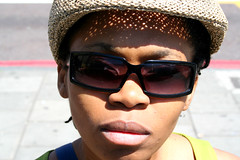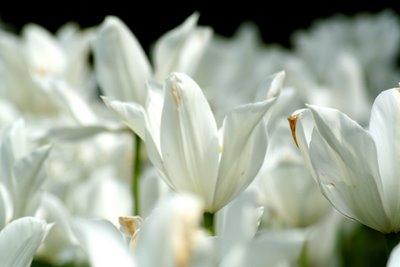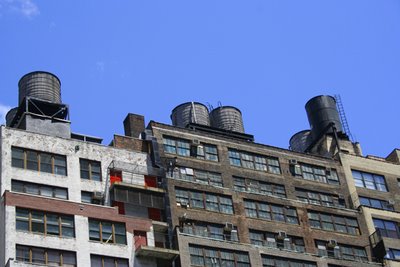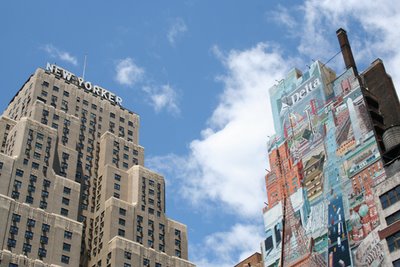Jide Adeniyi-Jones' thoughts on Nigeria
The photographer Jide Adeniyi-Jones sent this to myself and others today. He intended it to be published in the local newspapers (it was not). Please feel free to forward it on:
Some thoughts that I sent to the papers a month ago, since they were not
used I thought I would send them to a few friends:
‘This is Nigeria’
It is hard to say precisely when Nigeria lost its way, but soon after the
demise of the first republic we lost our self-confidence. In defense, we
took refuge behind words like Giant, Great and Excellence as if their
forceful proclamation would endow us with the qualities that they define.
The very need for these superlatives in the face of our obvious challenges
is itself symptomatic of our neurosis. But it is a little too easy to seek
the root of our current predicament in military intervention. After all the
military were hardly the bastion of the brightest and the best of our
pre-independence population. So in the battle for the soul of the nation,
they are unlikely to have won such a resounding victory; even with all the
instruments of coercion at their disposal. No, I think we have to look a
little farther back.
Pre-independence politics, as dubious as it sometimes was, did not sink to
the universal game of shadows and echoes that it has become today; where the
vitally important issues of human interaction are in the hands of sorcerers
skilled in slight of tongue and hand, with the spoils going to the slickest
or most ruthless shyster. A politics of ideas was emerging with
inspirational thinkers like Chief Obafemi Awolowo, Dr Nnamdi Azikiwe and Sir
Ahmadu Bello prominent among its leaders. Today, of course, all of their
epithets Chief, Dr and Sir regularly preface a single individual’s name
assigning to him or her unmerited qualities of all the titles. Our fear of
accomplishment makes us democratize it, we spread it everywhere, in the
process trivializing achievement and making a mockery of cultural, academic,
and religious endeavor.
Proof of the early politics of ideas, can be found in the NCNC (National
Council of Nigeria and the Cameroons) triumph in the erstwhile Western
Region. But Nigeria lost its essence the day the western legislators
‘crossed carpet’ to install Awo instead of Zik, a non-Yoruba, as premier.
Thought and ability quietly lost their currency as the pursuit of our
highest common factor gave way to a desperate clinging to our lowest common
denominator. We became consumed with claiming for our ethnic allocation of
the national pie, meanwhile the short-circuiting of the fledgling political
system in Ibadan resulted in the morass that is Nigeria today.
‘This is Nigeria’ I feel fortunate to be old enough to remember a time when
those same words, with slightly different emphasis, carried a code
diametrically opposed to what they represent today. The indignant ‘that
cannot happen here, this is Nigeria, not some banana republic.’ of my youth,
has given way to a resigned, ‘Siddon there my friend, this is Nigeria’. The
code works with ruthless efficiency and enjoys universal recognition and
acceptance. Nigerians and non-Nigerians alike understand and use the phrase
to end discussion of the most shocking and disgraceful occurrences. It
quells all outrage or enquiry, as it unfailingly co-opts us into impotent
acceptance of our common inability to live up to our potential, after all
this is Nigeria. We cannot ask very much of our peers or ourselves; this is
Nigeria.
Hearsay has it that, in the run up to the recent Senate reading of the
constitutional amendment bill, the third term architects at The Rock, when
cautioned that success of the project did not look likely, commanded ‘Make
it happen, this is Nigeria!’ Today there is a distinct air of confidence
even on danfo buses as I overhear ‘They could never have succeeded sha, this
is Nigeria’. Thus the battle for the soul of Nigeria continues.
In retrospect, it seems that the whole drawn out third term drama was
therapeutic for the nation. Whether President Obasanjo wanted a third term
or not is neither here nor there. In the end, the attempt was foiled, not by
the will of a good or bad president, but by an emerging democratic
structure. Balance of powers, the legislature curbing the potential excess
of the executive. Straight from the textbook on democracy, this is Nigeria.
As for Obasanjo, with all his strengths and weaknesses, he has always
appeared to me to have an eye on posterity. As post colonial African history
is written, he has tried to position himself to be in the chapter with
Mandela rather than Mobutu. So it seemed to me a distortion of common sense
that he would today be striving for a third term in office. It appears that
I was probably dead wrong. Robert Mugabe, reviled today in some circles, was
a bona fide African champion as he led a courageous and principled assault -
from the bush and then the ballot box - on Ian Smith’s stranglehold on
Rhodesia. To this day I get goose bumps when I remember him at Rufaro
Stadium, after midnight, with Bob Marley celebrating the liberation of
Zimbabwe. Liberation that left apartheid South Africa exposed and alone, a
night on which he symbolized endless possibilities for Africa. What changed
Mugabe? I do not know, not having walked in his moccasins. So it is with
OBJ. His experience under the boot of Abacha followed by years surrounded
by the sycophantic hordes in Aso and environs may well have altered his
self-image. The Museveni example may also have encouraged him to think that
a change in the constitution might do the trick.
Constitution change having failed, much time is still being wasted in
speculation about what the president will do now to achieve a third term or
who he will select to succeed him? This is idle speculation because if we
have learnt anything from the last couple of weeks, Baba’s endorsement of a
candidate now may be the kiss of death for that individual’s presidential
ambition. In our far from perfect legislature, members on the right side of
history, have a newfound swagger in their stride. A fresh confidence and
pride borne, not from their bank balances, but from the respect and
adulation of those whose interest they are supposed to serve. In the system
when a few good men and women stand up remarkable things are possible, this
is Nigeria.
There are indeed tides in the affairs of men, which taken at the flood lead
to good fortune, but if missed leave you high and dry. Luckily, the nature
of tides is that they return in cycles giving second and third chances at
success. This is cold comfort if you live in a country that serially misses
its tides, but it is reassuring in the grand scheme of things to know that
with each new surge we have another chance to steer a steadier course. I,
like many others, experience ebbs and flows of despair and hope on our
chequered road to tomorrow. We have been stuck in a mire of, turn-by-turn,
chop and go politics, with our main focus being on whose turn it is chop
next. Meanwhile, measured by almost any social indicator that you choose,
life in Nigeria has declined or at best stagnated over the last few decades.
Today the paradox of Nigeria is exemplified by fiber optic cable being laid
through the length and breath of a country whose minister of power says will
not have steady supply of electricity for the next fifty odd years.
If the flicker seen recently in the national assembly becomes a flame, even
the honorable minister may be surprised at what is possible; after all there
was a time when we put our best foot forward in an attempt to build a
nation. Umoru Altine was the mayor of Enugu. Mazi Unbonu Ojike was the
deputy Mayor of Lagos. People like Mercy Eneli were on the Lagos city
council (and their seats were not zoned to them). So we will see the
not-to-distant day in which the inhabitants of Zamfara State, realize that
the administrator in Abuja assuring that their environment is protected from
ruthless mineral exploitation is a woman named Oby, and that the local bank
manager giving the market woman in Ogun state a loan was born in Borno. That
will be the day in which Nigeria has found itself once again.
By: Jide Adeniyi-Jones




















